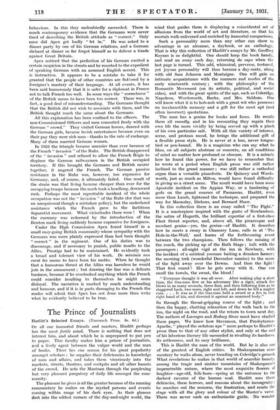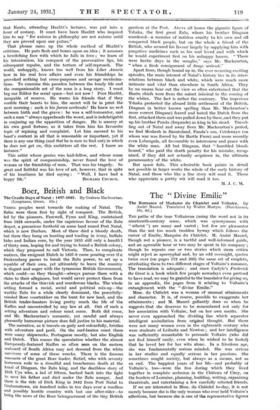The Prince of Journalists
Hazlitt's Selected Essays. (Nonesuch Press. 8s. 6d.)
OF all our immortal friends and masters, Hazlitt perhaps has the most fertile mind. There is nothing that does not interest him, and about which he is unprepared to put pen to paper. This faculty makes him a prince of journalists, and a lively agent between the vulgar world and the man of books. There lies one reason for his great popularity amongst scholars : he supplies their deficiencies in knowledge of men and affairs, and takes them vicariously into the markets, streets, theatres, and cockpits and all other haunts of the crowd. He acts the Mantuan through the perplexing but very pleasant purgatory of daily life amongst the com- munity.
The pleasure he gives is all the greater because of the running commentary he makes on the myriad persons and events coming within range of his dark• eyes. As their glances dart into the oddest corners of the day-and-night world, the mind that guides them is displaying a coincidental set of allusions from the world of art and literature, so that his
mortals walk enlivened and enriched by immortal comparisons. Such a personality more than any other can show to advantage in an almanac, a daybook, or an anthology.
That is why this collection of Hazlitt's essays by Mr. Geoffrey Keynes is so delightful. One should keep the book handy, and read an essay each day, returning da capo when the last page is turned. This odd, whimsical, perverse, tortured, yet joyous personality will thus become a day-mate, along
with old Sam Johnson and Montaigne. One will gain an intimate acquaintance with the manners and modes of the early nineteenth century ; with the philosophy of the Romantic Movement (on its artistic, political, and social sides), and with the great spirits of the age, such as Coleridge,
Napoleon, Wordsworth, Burke, and Mrs. Siddons. One will know what it is to hob-nob with a great wit who possesses an inexhaustible memory and a gift for the most apt (and often incorrect) quotations.
The man has a genius for books and faces. He recalls them all roundly, and in his recounting they regain their own life the more vividly by being served up with a pinch of his own particular salt. With all this variety of interest, scene, and protean mood, he brings the additional gift of a flexible prose style. He is never at a loss, never tongue- tied or pen-bound. He is a magician who can say what he likes, on all subjects abstruse or concrete, on all conditions of mind no matter how profound or obscure. It is a miracle how he found this power, for we have to remember that he wrote at a period when English prose was still rather inclined to the grand manner ; was still rather a cathedral organ than a versatile pianoforte. De Quincey and Words- worth, just as much as Milton, would have found difficulty in giving us a street scene. The result would have been some Apostolic incident on the Appian Way, or a lumbering of gods on the grand courses of Parnassus. Hazlitt, even more than Lamb, lightened the technique, and prepared the way for Macaulay, Dickens, and Bernard Shaw.
In this collection there is an essay called " The Fight." It is a masterpiece inspired with the gusto of Rowlandson, the satire of Hogarth, the brilliant expertise of a first-class Fleet Street reporter, and, above all, the picaresque and mordant genius—yes, the genius—of Hazlitt. It describes how he meets a crony in Chancery Lane, calls in at The Hole-in-the-Wall,' and learns of the forthcoming event between the two champions. Then follows the missing of the coach, the picking up of the Bath Stage ; talk with the passengers ; all-night vigil at the inn in Newbury, with the incident of a satirical yeoman baiting a drunken farmer ; the morning trek (wonderful December sunrise) to the scene of the fight away over the Downs. And then the fight ! That first round ! How he gets away with it. One can smell the towels, the sweat, the blood !
"Everyone thought it was all over. After making play a short time, the Gas-man flew at his adversary like a tiger, struck five blows in as many seconds, three first, and then following him as he staggered back, two more, right and left, and down he fell a mighty ruin. . . . It was as if the Gas-man held a sword or a fire in that right hand of his, and directed it against an unarmed body."
So through the throat-gripping course of the fight ; and then the happy, chatting relaxation of the walk back to the inn, the night on the road, and the return to town next day. The authors of Lavengro and Rodney Stone must have studied
these pages. We know. how Stevenson, that Presbyterian- Apache, "-played the sedulous ape " more perhaps to Hazlitt's prose than to that of any other stylist, and only at the end
of his laborious literary life succeeded in rivalling its hardness, its artlessness, and its easy brilliance.
This is Hazlitt the man of the world. But he is also one of the greatest of English critics. In Shakespearian com- mentary he walks alone, never treading on Coleridge's ground. What revelations he makes in that world of anarchic beauty, among the tragic and sinister mountains of Shakespeare's impenetrable nature, where the most exquisite flowers of
laughter—age-old, folk-born—spring at the entrance to the darkest caverns of the human ' soul. Hazlitt sees these delicacies, these horrors, and reasons about the incongruity :
he searches out the remorse, the frustration, and-resets the stage with• all the glory and colour of the 'Master's verse.
There was never such- an enthusiastic guide. No wonder that Keats, attending Hazlitt's lectures, was put into a fever of ecstasy. It must have been Hazlitt who inspired him to say " for axioms in philosophy are not axioms until they are proved upon our pulses."
That phrase sums up the whole method of Hazlitt's criticism. He puts flesh and bones upon an idea ; it assumes a bewitching face with which he falls in love ; we learn of his intoxication, his conquest of the provocative lips, his subsequent repulse, and the torture of self-reproach. The world, unhappily, knows too well from his Liber Anioris how in his real love affairs and even his friendships he provoked nothing but cross-purposes and savage recrimina- tions. To examine this paradox between the lonely life and the companionable art of the man is a long story. I must beg our Editor for serial space—but not now I Poor Hazlitt, incapable of reserve. He warns his friends that if they confide their hearts to him, the secret will be in print the next morning : such is his furore scribendo! He knew no rest between birth and the grave : he was a self-tormentor, and such a man " always apprehends the worst, and is indefatigable in conjuring up the apparition of danger. He is uneasy at his own good fortune, as it takes from him his favourite topic of repining and complaint. Let him succeed to his heart's content in all that is reasonable or important, yet if there is any one thing (and that he is sure to find out) in which he does not get on, this embitters all the rest. I know an instance."
This artist whose genius was hail-fellow, and whose muse was the spirit of companionship, never found the love of woman or the friendship of men. That was his tragedy. So great and faithful was his love of art, however, that in spite of his loneliness he died saying : " Well, I have had a







































 Previous page
Previous page